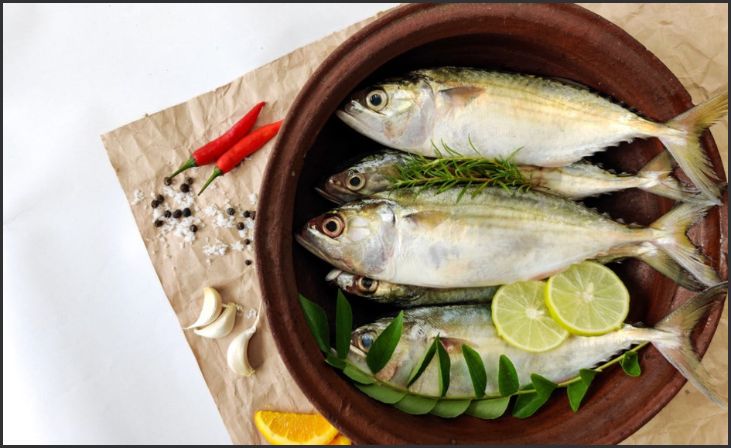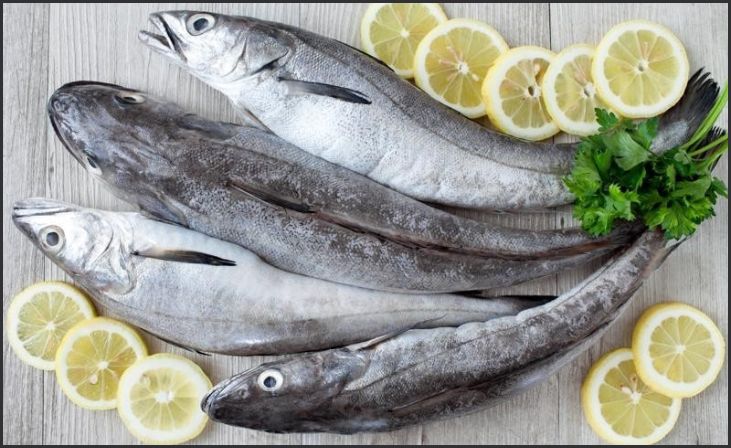Best Types of Fish to Eat – Incorporating fish into one’s diet is widely recognized for its numerous health benefits, making it essential to identify the best types of fish for optimal well-being. Beyond being an excellent source of high-quality protein, fish, particularly those rich in omega-3 fatty acids, offers cardiovascular and cognitive advantages.
However, as overfishing and environmental concerns rise, selecting sustainable options becomes paramount. This guide explores criteria such as nutrient content, sustainability, and low mercury levels to highlight top choices like salmon, mackerel, cod, tilapia, and rainbow trout.
Understanding the importance of responsible consumption and considering factors like wild-caught versus farm-raised, this outline aims to empower individuals in making informed decisions about their fish intake for a healthier and environmentally conscious lifestyle.
Salmon
Salmon, a nutrient-packed fish, is renowned for its rich flavor and health benefits. A top source of omega-3 fatty acids, it supports heart health and cognitive function. With its vibrant pink flesh, salmon is not only delicious but also versatile in cooking methods.
Grilled, baked, or pan-seared, it retains its tender texture. Additionally, salmon provides essential nutrients like vitamin D and protein.
While enjoying its culinary appeal, it’s advisable to opt for sustainably sourced salmon, promoting both personal well-being and environmental responsibility.
Also, Read – Chocolate Chip Cookies Recipes
Mackerel

Mackerel, a flavorful and nutritious oily fish, is celebrated for its abundance of omega-3 fatty acids, promoting heart health and cognitive function. With its bold taste and high nutritional value, mackerel stands out as a culinary delight.
Whether grilled, smoked, or canned, it retains its distinctive flavor and tender texture. Rich in vitamin D, protein, and essential minerals, mackerel contributes to overall well-being.
Considered a sustainable choice, it embodies a balance between taste and environmental responsibility. Incorporating mackerel into your diet adds not only culinary diversity but also a health-conscious element to your meals.
Sardines
Sardines, small yet mighty, are nutritional powerhouses packed with omega-3 fatty acids, calcium, and vitamin D. With their rich, savory flavor, sardines offer a delectable addition to various dishes. These small fish provide a sustainable seafood option, making them an environmentally conscious choice.
Whether enjoyed fresh, grilled, or canned, sardines maintain their robust taste and firm texture. Beyond their culinary appeal, sardines support heart health and bone strength.
Including sardines in your diet not only elevates the taste of your meals but also contributes to a well-rounded and health-conscious approach to nutrition.
Also, Read – Apple Cider Vinegar: Does it Expire
Trout
Trout, a freshwater gem, offers a delectable combination of lean protein and omega-3 fatty acids. Its mild, delicate flavor and tender texture make it a versatile addition to various culinary creations. Rich in nutrients, including vitamin B, selenium, and phosphorus, trout supports overall health.
Whether pan-seared, grilled, or baked, trout maintains its distinctive taste. As a sustainable choice, responsibly sourced trout reflects a commitment to environmental well-being.
Incorporating this flavorful fish into your diet not only enhances your dining experience but also provides essential nutrients for cardiovascular health and overall nutritional balance.
Tuna (skipjack)
Skipjack tuna, a popular choice for its mild flavor and versatility, is a lean fish rich in protein and essential nutrients. With lower mercury levels compared to some other tuna varieties, skipjack is commonly used in canned tuna.
This sustainable option aligns with responsible fishing practices. Whether enjoyed in salads, sandwiches, or sushi, skipjack tuna maintains its firm texture and mild taste. Abundant in omega-3 fatty acids, it promotes heart health and overall well-being.
Choosing skipjack tuna contributes to a balanced diet, combining culinary satisfaction with environmental awareness for a conscientious and nutritious dining experience.
Cod

Cod, a mild and flaky white fish, is a culinary favorite renowned for its versatility and delicate taste. Low in fat and a good source of protein, cod is a healthy addition to various dishes. Whether baked, grilled, or pan-seared, cod retains its firm texture, making it an excellent choice for both simple and elaborate recipes.
Beyond its culinary appeal, cod is a rich source of essential nutrients, including vitamin B12 and phosphorus. Known for its sustainability, responsibly sourced cod supports environmentally conscious choices.
Embrace the nutritional benefits and culinary possibilities by incorporating cod into your diet for a delightful and health-conscious dining experience.
Haddock
Haddock, a white fish with a mild and sweet flavor, is prized for its tender texture and versatility in cooking. Low in fat and high in protein, haddock is a nutritious choice that complements various culinary styles.
Whether baked, fried, or grilled, it maintains its firmness and delicate taste. Rich in essential nutrients like vitamin B6 and B12, haddock supports overall well-being. Recognized for its sustainable practices, responsibly sourced haddock aligns with environmental considerations.
Enjoying haddock not only offers a delightful dining experience but also contributes to a health-conscious approach, combining taste and nutritional benefits in a mindful and sustainable manner.
Halibut
Halibut, a lean and mild-flavored fish, is prized for its firm texture and versatility in culinary applications. Whether grilled, baked, or pan-seared, halibut maintains its delicate taste and moist consistency.
A rich source of high-quality protein, halibut also provides essential nutrients like selenium and omega-3 fatty acids, supporting heart health and overall well-being. As a sustainable choice, responsibly sourced halibut aligns with environmental considerations.
Its popularity stems from its culinary appeal, making it a delectable option for those seeking a light and nutritious seafood choice. Including halibut in your diet offers a flavorful and health-conscious addition to diverse culinary creations.
Rainbow Trout
Rainbow trout, a flavorful freshwater fish, delights palates with its tender texture and mild taste. Rich in omega-3 fatty acids and protein, it promotes heart health and overall well-being. Whether grilled, baked, or pan-seared, rainbow trout maintains its distinctive flavor profile, making it a versatile choice for various recipes.
Packed with essential nutrients like vitamin D and B12, rainbow trout contributes to a balanced diet. With its sustainable sourcing options, choosing responsibly caught rainbow trout reflects an environmentally conscious decision.
Incorporate this nutritious and delectable fish into your meals for a delightful culinary experience that aligns with both taste and health-conscious considerations.
Anchovies

Anchovies, small yet potent, add a burst of intense flavor to dishes. Packed with omega-3 fatty acids, these tiny fish contribute to heart health and offer a rich source of protein. Whether in salads, pasta, or as a pizza topping, anchovies impart a distinctive umami taste.
While their strong flavor may not appeal to everyone, anchovies are a culinary treasure for those who appreciate their bold and salty profile.
These small fish also come with the advantage of being a sustainable choice, emphasizing the importance of responsible seafood consumption. Embrace the culinary adventure and nutritional benefits of anchovies in moderation for a unique and savory experience.
Importance of including fish in the diet
Incorporating fish into the diet holds immense importance owing to its multifaceted impact on overall health. Fish, particularly fatty varieties, such as salmon, mackerel, and sardines, are rich sources of omega-3 fatty acids, essential for brain function and cardiovascular health. The high-quality protein found in fish supports muscle development and maintenance. Additionally, fish is a unique dietary source of various vitamins and minerals, including vitamin D, iodine, and selenium.
Consuming fish has been linked to a reduced risk of chronic diseases such as heart disease and stroke. Omega-3 fatty acids contribute to lowering blood pressure, reducing inflammation, and improving cholesterol levels. Furthermore, the omega-3s found in fish are crucial for the development of the brain and nervous system, particularly in infants and young children.
Conclusion
In conclusion, the inclusion of fish in your diet is a nutritional investment with far-reaching benefits. Packed with omega-3 fatty acids, proteins, and vital nutrients, fish supports heart health, brain function, and overall well-being.
Opting for sustainable choices ensures a positive impact on both personal health and the environment. With diverse options and versatile cooking methods, integrating fish into your meals is a delicious and responsible way to enhance your diet. Make a conscious choice to prioritize these aquatic gems for a healthier, more sustainable lifestyle.
FAQs
Choosing the best types of fish is crucial for obtaining maximum health benefits while minimizing environmental impact. Optimal choices are rich in omega-3 fatty acids, low in mercury, and sourced sustainably, promoting both personal well-being and environmental conservation.
Fatty fish, such as salmon and mackerel, are rich in omega-3 fatty acids, which support heart health, reduce inflammation, and contribute to brain function. They also provide high-quality protein, essential vitamins, and minerals.
Fish with lower mercury levels include salmon, sardines, cod, tilapia, and rainbow trout. Choosing these options minimizes the risk of mercury exposure while still enjoying the nutritional benefits of fish.

Leave a Reply